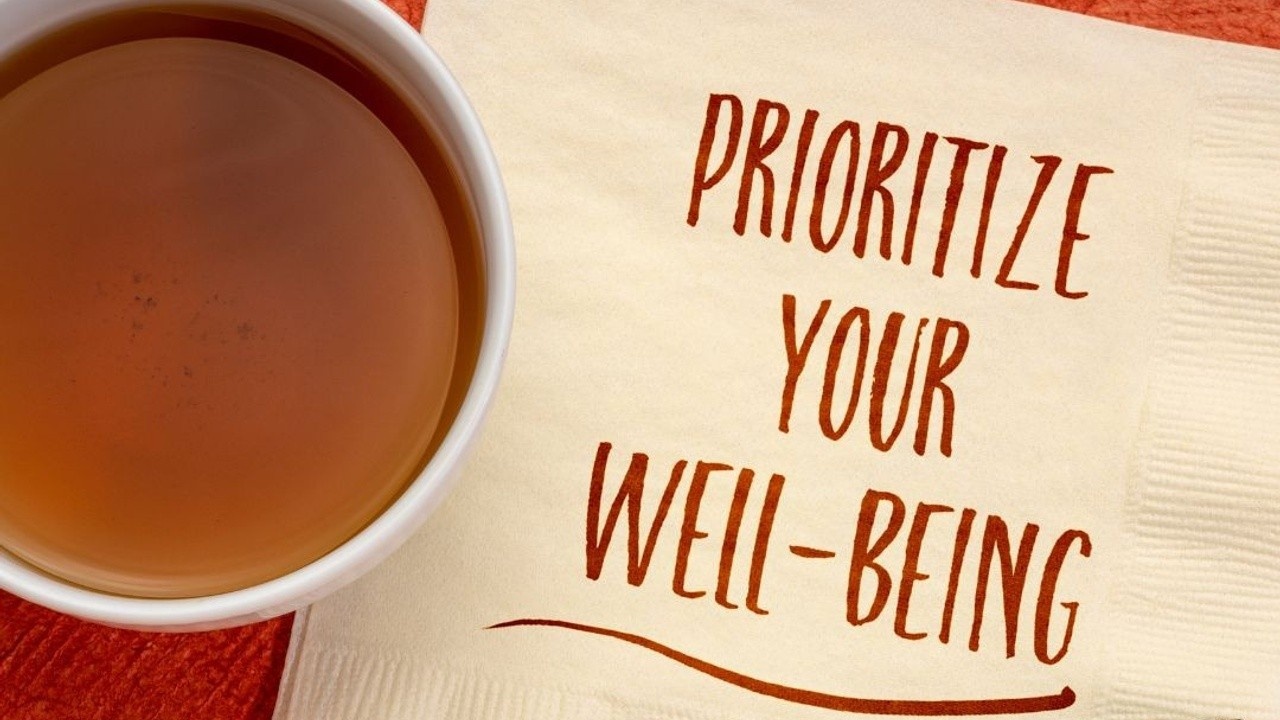Live Your Best Life!
Tips and actionable items to help you manage your mindset and achieve your goals so that you have success in all areas of your life. You deserve it and I am here cheering you on!!!
4 Strategies to Support Your Emotional Well-Being

Emotional well-being is just as important as physical well-being, however, it is often neglected until it becomes a significant concern. Your emotional well-being can impact how you feel on a daily basis, your outlook on life, your relationships, your career success, and the overall quality of your life. The goal in life should not be to “just get by”. The goal in life should be to thrive, feel joy, and to feel a sense of overall life satisfaction and fulfillment.

The reality is that you will be faced with challenges in your life. When you are emotionally well, you are better able to respond to unexpected events in a way that does not make the situation worse. You are also able to bounce back from adversity easier and faster. One way of taking care of your emotional well-being is to check in with yourself from time to time to assess how you are feeling, what you would like to experience more of, and what you would like to experience less of.
Below are some questions you can j...
3 Strategies for Creating Empowering Beliefs

What you believe about yourself, what is possible for you, and about the world around you impacts the life you create for yourself. Have you ever had periods of time where nothing is working in your favor and then other periods of time where it feels like many good things are coming your way all at once? This is a common experience for many people. So, the question is, why does this happen?

In my opinion, your belief system plays a big role in this. If it feels like things are not going your way, your mind will give you more evidence of this. It will also remind you of times in the past when things have not gone your way. If you are spending a lot of time focusing on negative things happening, you are signaling to your brain that negative things happening are important to you and it will then go to work for you and find more negative things. When this happens, you will not feel energized, excited, or hopeful, and therefore the actions you take can reinforce your beliefs that good t...
6 Daily Habits to Support Your Emotional Health

Your emotional health is about how you think and feel, as well as your ability to cope with challenges in life. It is not about being happy all the time, but rather it is about recognizing and managing how you are thinking and feeling on an ongoing basis. When you are emotionally healthy, you are aware of your thoughts and feelings, you feel in control of them, and you are able to bounce back when life throws challenges your way. Emotionally healthy individuals are typically adaptable, have coping strategies that they are able to implement during challenging times, and they have an overall positive mindset.

On the other hand, individuals who struggle with emotional health may experience more negative emotions (frustration, anger, sadness, hopelessness, or fear). They may also try to avoid or escape from certain life situations, lash out at loved ones, experience mood swings, withdraw, struggle professionally, struggle with relationships, sleep too much or too little, or eat too muc...
Moving From Being Interested to Being Committed

If you are like most people, you are interested in a lot of different things, but that does not necessarily mean you are committed to them. Maybe you want to consider a new career, starting a business, starting a new hobby, finding romance, improving your finances, organizing our home, or taking your health and fitness to the next level. When you are interested in something, you spend time thinking about it. This may generate feelings of excitement, curiosity, and maybe even a little fear or overwhelm.
Dreaming is one of my favorite things to do. For me, it creates feelings of excitement and energizes me. I can dream all day long, however, dreaming alone won’t get me anywhere. This is where commitment comes in. While being interested in something or dreaming about something requires thinking, commitment requires action. If you are truly committed to something, you will continue to pursue it, even when it gets hard, boring, frustrating, or inconvenient. If you are committed you are ...
6 Strategies for Reducing Self-Criticism

𝐓𝐡𝐞 𝐰𝐚𝐲 𝐲𝐨𝐮 𝐭𝐚𝐥𝐤 𝐭𝐨 𝐲𝐨𝐮𝐫𝐬𝐞𝐥𝐟, 𝐚𝐛𝐨𝐮𝐭 𝐲𝐨𝐮𝐫𝐬𝐞𝐥𝐟, 𝐜𝐚𝐧 𝐛𝐞 𝐦𝐨𝐭𝐢𝐯𝐚𝐭𝐢𝐧𝐠 𝐚𝐧𝐝 𝐩𝐫𝐨𝐝𝐮𝐜𝐭𝐢𝐯𝐞, 𝐨𝐫 𝐢𝐭 𝐜𝐚𝐧 𝐡𝐨𝐥𝐝 𝐲𝐨𝐮 𝐛𝐚𝐜𝐤, 𝐜𝐫𝐞𝐚𝐭𝐞 𝐧𝐞𝐠𝐚𝐭𝐢𝐯𝐞 𝐟𝐞𝐞𝐥𝐢𝐧𝐠𝐬, 𝐚𝐧𝐝 𝐫𝐞𝐬𝐮𝐥𝐭 𝐢𝐧 𝐥𝐨𝐰 𝐬𝐞𝐥𝐟-𝐞𝐬𝐭𝐞𝐞𝐦. We all have an inner dialogue which can look like an inner coach, or an inner critic. What you think about yourself impacts how you feel, how you behave, and the results you get in life. The goal is to have self-talk that encourages you to want to improve, while also accepting the person you are without harsh criticism.

The way you talk to yourself can cause painful emotions, which makes it harder to show up and behave in the way you want to. If you sit with these painful or negative emotions for an extended period of time, it can negatively impact the results you get in your life. It can also negatively impact your relationships because you may either withdraw, if you don’t feel worthy of a relationship, or it could cause you to push someone away because they don’t want to hear you talk negatively about yourself ongoing. ...
Level Up Your Identity and Level Up Your Life

The Merriam-Webster dictionary defines “identity” as, “the distinguishing character or personality of an individual”. Your identity is composed of the qualities and characteristics that make you different and unique from everyone else on this planet. When describing your identity you may describe your gender, race, ethnicity, sexual orientation, physical attributes, profession, personality, or who you are in relationship with others.
Your identity impacts the relationships you have, your finances, your educational and professional decisions, your emotions, how you feel about yourself on an ongoing basis, and your overall success in life. Your identity can empower you and allow you to continue to dream bigger and take big action, or it can limit you and cause you to hold back and shrink. Where your identity is today started when you were very small. It is the result of messages you received about your strengths and weaknesses, your importance to others, your life experiences, the c...
Manage your “Internal Temperature”: 8 Steps to Help You Manage Your Thoughts, Emotions, and the Results You Get in Your Life

As the seasons are changing for many of us in the world, it got me to thinking about how so many of us pay attention to, and try to regulate our external temperature, while completely neglecting our "internal" temperature. Most of us like to keep our external temperature about the same all year long, give or take a few degrees. To do this, we turn our heat or air conditioning up or down to stay in our comfortable range, regardless of the season. But what about our internal temperature?

You likely know what your external temperature comfort zone is, but do you know what your internal temperature comfort zone is? This is the place in your life where you are most comfortable. It is the place that is most familiar and where you are likely "reset" to if you start to move away from it. It consists of behaviors, thinking patterns, and habits and it is driven by both your conscious and unconscious thoughts about what you are capable of, what you believe about yourself, and where...
Are You Using a “Life Lens” That Works for You, Or Against You?

We all have a lens through which we view the world. This lens is created over time, starting at a young age, and is the result of our life experiences, what we have been told about ourselves, others, the world, and what we think about ourselves. This lens impacts the way we see things and can be very subjective. This is the reason why two people could be in the same situation and think and feel very differently about it.
It is important for you to know that this lens exists, but also for you to check in on your lens and assess whether it is working for you, or against you. This lens is heavily tied to your belief system and your mindset. For example, if you were going on a job interview and your belief system was that you were not good at interviewing and you were not one hundred percent qualified for the job, you would likely show up to the interview differently than someone who was very confident in both their interview and professional skills. In addition, if you believed you we...
10 Strategies for Dialing Up and Sustaining Motivation

Do you wish you were more motivated overall? Do you wish you could sustain your motivation over longer periods of time? If so, you are not alone. It feels great when you are motivated and operating at a high level, am I right? Unfortunately, the reality is that motivation is not sustained at a high level naturally. It is inevitable that it will dip. How much it dips, and for how long it dips, varies from person to person.

Some reasons you could be lacking motivation are you are experiencing low energy, the task at hand feels boring, the task at hand will require you to experience some discomfort, the task at hand is unfamiliar and/or there is uncertainty, you feel overwhelmed, you are lacking confidence, or you are experiencing some emotional concerns such as depression or anxiety. The good news is that there are things that you can do to both dial up and sustain your motivation. If you are concerned you are experiencing emotional or mental health concerns, seek the help of a profe...
5 Tips for Managing Perfectionism

Do you suffer from perfectionism? This can take place when you think you need to learn more before starting, when you think you need to keep checking something and refining it over and over, when you create stories in your mind about a catastrophic outcome if you put something out into the world that is less than perfect, when you worry that people will not approve of you if something is less than perfect, or when you try to control situations and other people who are not meeting your expectations. While perfectionism can be motivating at times, the problem with perfectionism is that in the pursuit of trying to be perfect, you get less done, you feel like you are disappointing others, or you feel less confident in yourself.
Perfectionism is usually driven by internal pressure. The standards of a perfectionist are usually much higher than the standards of others and often, the standards are unrealistic. Perfectionists spend a lot of time focusing on mistakes and are driven by fear o...


